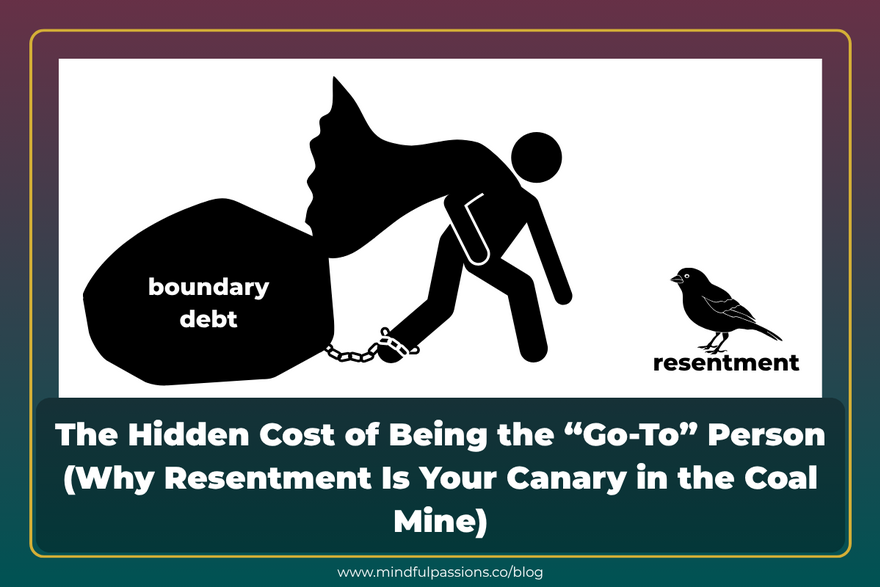
You’re the reliable one. The fixer. The person everyone turns to when things get messy.
And let’s be real—it feels good. People trust you. They know you’ll get it done. You carry that badge of honor with pride.
But lately? The badge feels more like a weight.
Because behind the dependable smile, something else is building: resentment.
👉🏾 Looking for the bigger picture? Check the Boundary OS Hub to see how this post fits into the full system.
The Compliment That Comes with a Cost
Being the “go-to” person looks great from the outside. But inside, you know the truth:
- You’re stretched too thin.
- You’re secretly irritated when people lean on you.
- You fantasize about saying no, but the word sticks in your throat.
This tension isn’t just stress. It’s a sign you’re accumulating Boundary Debt.
Resentment: The Canary in the Coal Mine
Most of us think of resentment as a negative emotion. Something to suppress. Something to feel guilty about.
But here’s the shift: resentment is a signal, not a failure.
Think of it like the historical canary in the coal mine. Miners didn’t wait for the explosion—they relied on the bird to warn them before danger hit.
Your resentment works the same way. It’s your system telling you: “You don’t have the capacity for this. Something’s wrong.”
Ignore it, and burnout is inevitable.
The Trap of Competence
Here’s why being The Best actually puts you at higher risk:
- You’re rewarded for saying yes.
- You hold yourself to impossible standards.
- You default to the Reflexive Yes—agreeing automatically, even when you don’t have the bandwidth.
Every one of those reflexes adds to your debt. And debt doesn’t just go away. It compounds until it drains your Energy, Attention, and Mood—the three personal resources you need to function.
Boundary Debt: The Hidden Bill
Boundary Debt is the unpaid bill you rack up every time you override your capacity to protect your identity as the dependable one.
Symptoms include:
- Resentment: Irritation, sighs, or dread when people ask for “just one more thing.”
- Distraction: Inability to focus because your brain is juggling too much.
- Exhaustion: The hollow tiredness that no amount of sleep fixes.
If you’re living in this state, it doesn’t matter how much you rest—you’ll stay drained until you stop taking on more debt.
The Need for a Diagnostic Tool
Here’s the problem: humans are terrible at catching resentment in real time.
We ignore it until it explodes—snapping at a loved one, quitting suddenly, or shutting down completely.
That’s why you need a tool to measure resentment before it spirals.
Enter: the Resentimeter.
The Resentimeter: Turning Feelings into Data
The Resentimeter is a simple 0–10 scale that measures your internal reaction to a request.
Here’s how it works:
- 0–1: No friction. You feel open and generous.
- 2–3: Mild discomfort. You’re thinking, “Why can’t they handle this themselves?” → Mandatory pause.
- 4+: Active frustration or anger. This is overload. A boundary or no is required.
The golden rule: anything at 2 or higher is a signal.
That means the answer cannot be an automatic yes.

A Real-Life Example
It’s 4:55 p.m. on Friday. A colleague drops by: “Can you look over this before the weekend?”
- Resentimeter reading: 3.
- Translation: mild irritation = boundary debt in progress.
Instead of saying yes, you pause. You might respond: “I want to give this my full attention, but I don’t have the bandwidth tonight. Can I get it back to you Monday morning?”
That one check saves you from a weekend of silent frustration.
From Resentment to Resources
The Resentimeter is just the start. Once you’ve spotted resentment, the next step is checking your Personal Resource Gates—Energy, Attention, and Mood.
Because saying yes isn’t just about time. It’s about whether you actually have the internal capacity.
- Energy low? You’ll drag yourself through.
- Attention low? You’ll make mistakes.
- Mood low? You’ll snap at someone who doesn’t deserve it.
By checking these gates, you turn your invisible capacity into clear, actionable data.
The Flow of the System
Here’s how it all comes together in the MPI Boundary Systems Framework:
- A request comes in.
- You take a One-Breath Pause to break autopilot.
- You check your Resentimeter.
- If resentment is high, you check your Personal Resource gates (Energy, Attention, Mood).
- You then use the Capacity-First Decision Reflex (CFDR) to decide: Proceed, Pause, Propose, or Decline.
This isn’t about being selfish. It’s about being resourced.
Why This Matters
When you use the Resentimeter, something shifts:
- You stop treating resentment as shameful.
- You start treating it as useful data.
- You make decisions based on your true capacity, not on fear or obligation.
And when you do say yes? It’s intentional. You follow through without bitterness.
That’s how you protect your resources while still showing up as the reliable person you want to be.
Conclusion: Listen to Your Canary
Being the “go-to” person shows your heart — but even the strongest systems fail when they ignore early warnings.
Resentment isn’t weakness; it’s information. Your canary isn’t scolding you — it’s trying to save you from collapse.
In the next post, Drained? Why Self-Care Tips & Productivity Hacks Aren’t Fixing Your Problem, you’ll see why those quick fixes don’t refill your energy — and how to start building a real system that does.

Comments